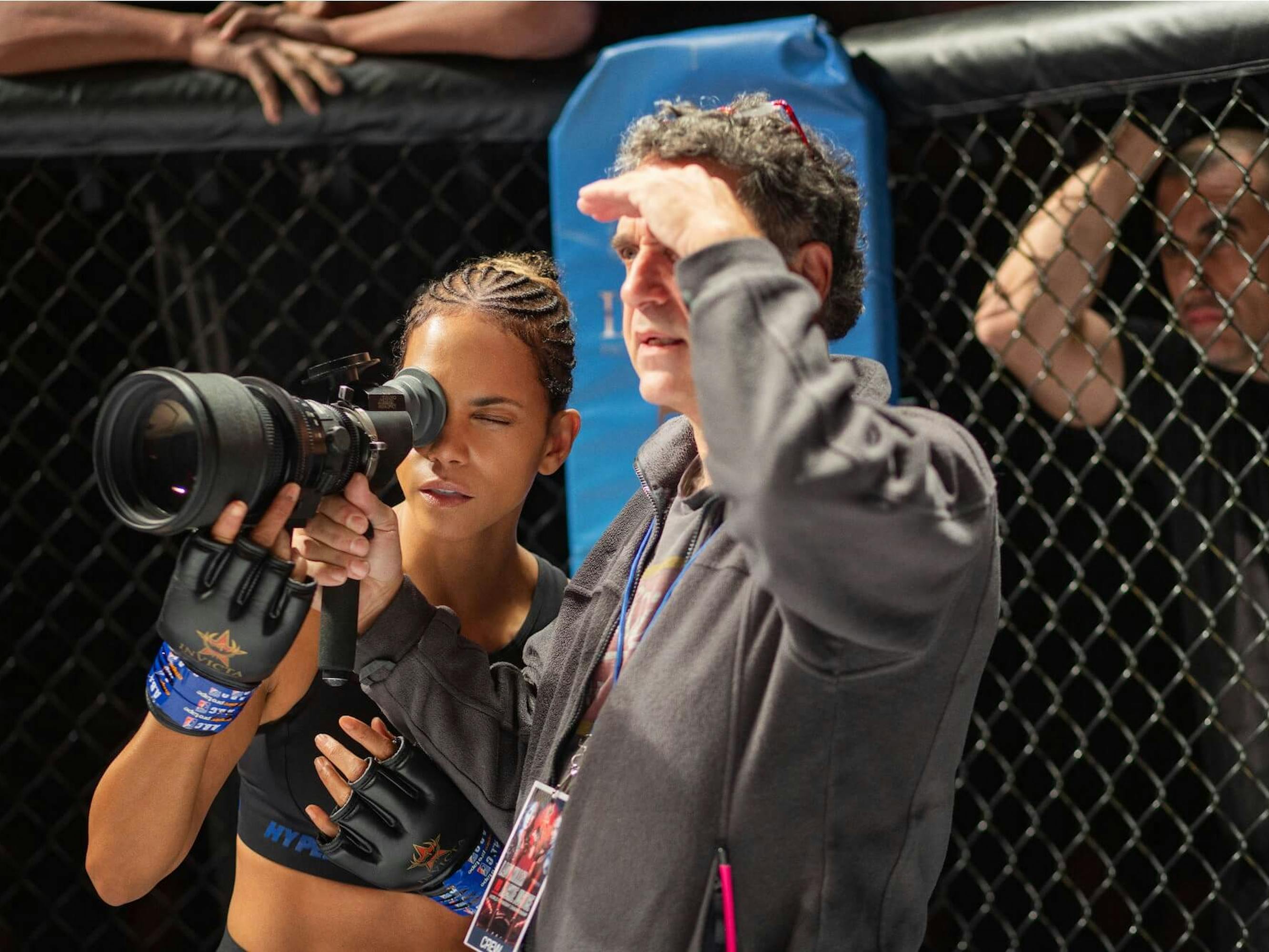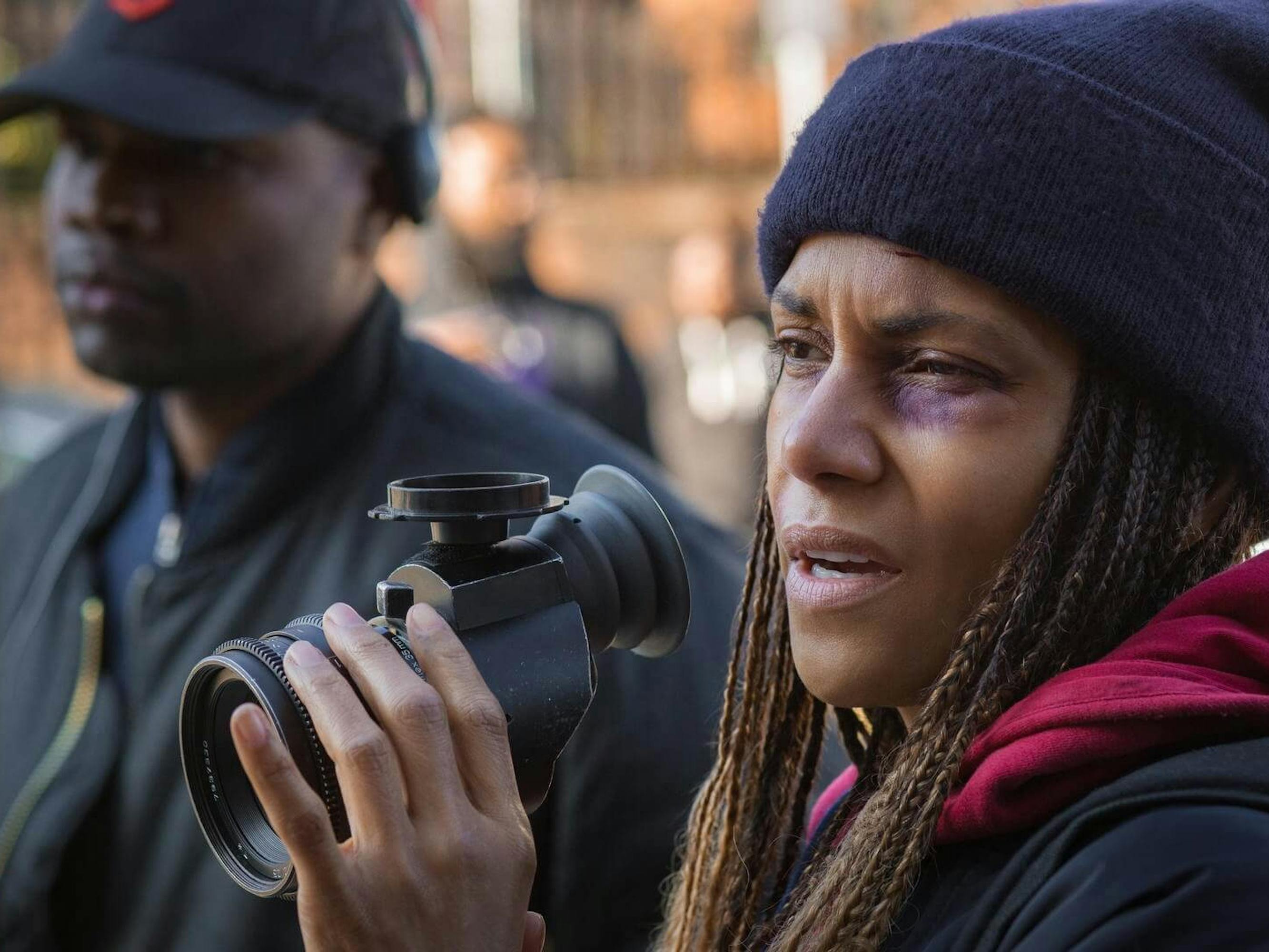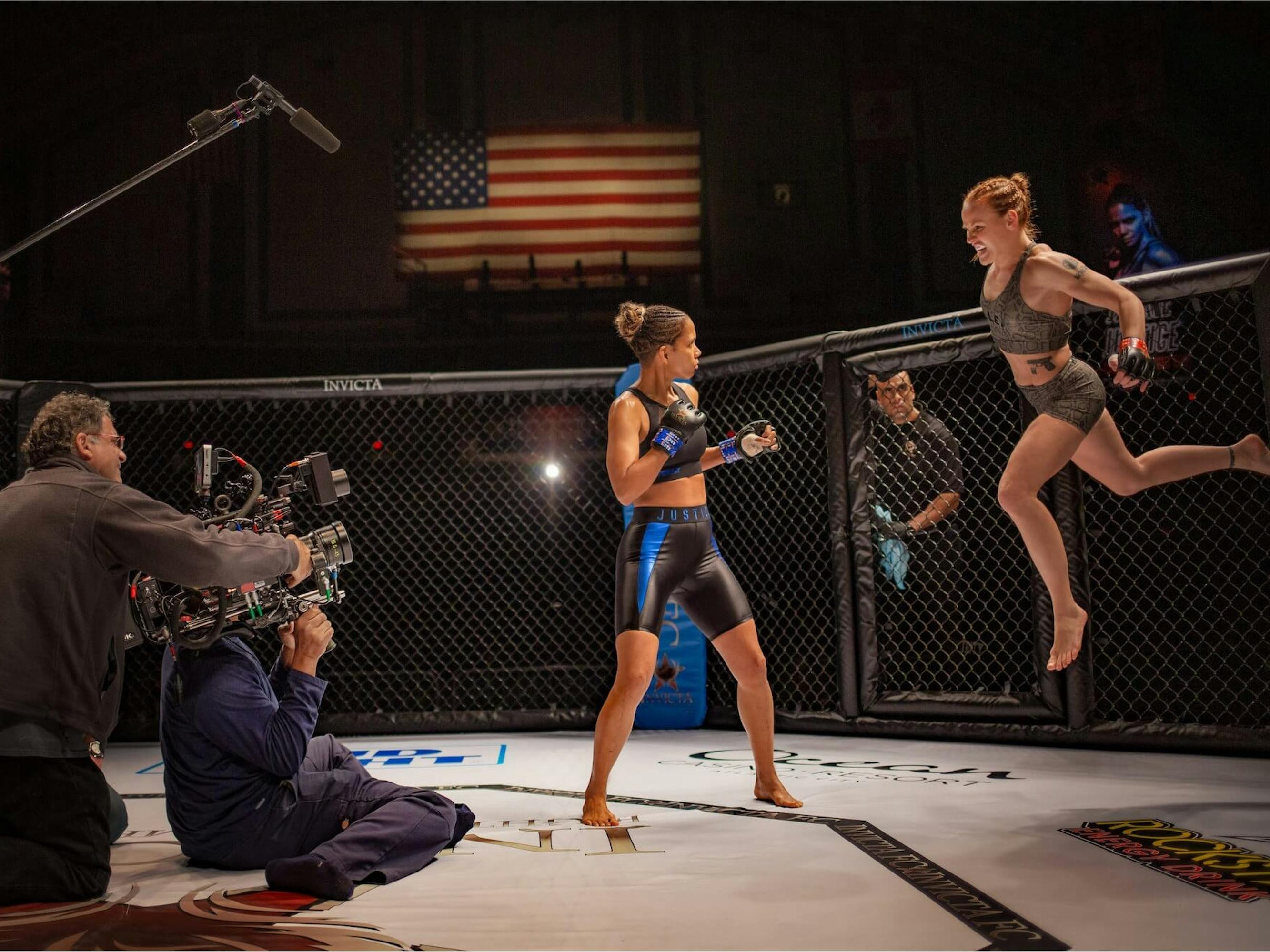The record-breaking actor shares about her directorial debut Bruised, and what she’s been fighting for all along.
Halle Berry has often heeded the call to action. She possessed supernatural powers as Storm in the X-Men franchise, proved an adept assassin in 2019’s John Wick 3, suited up as Catwoman, and was a worthy sparring partner to James Bond in 2002’s Die Another Day. The only thing more impressive than Berry’s fighting skills are her acting chops: She won an Oscar for Best Actress thanks to her turn in 2001’s Monster’s Ball, and she took home a Golden Globe and Emmy for 1999’s Introducing Dorothy Dandridge. Now, three decades into her career, Berry is showcasing both her physical and mental prowess, as the star — and director — of the drama Bruised.
When she first read the script in 2017, Berry was immediately drawn to the character of Jackie Justice, a former mixed martial arts (M.M.A.) fighter who has fallen from grace. Jackie is working as a house cleaner and struggling with alcohol when she gets involved in a brawl at a fight club with her manager-boyfriend. After she handily defends herself, Jackie is approached by a promoter, who convinces her to re-enter the ring for one last bloody fight and a chance of redemption. On her way home, her young son — whom she left when he was a newborn — arrives at her doorstep. Berry was ready to tackle the beleaguered role. The problem: The role was written for a twentysomething year-old white woman, and Blake Lively had her name on it.
For six months, Berry imagined how the project might be recast for an older actress. When Lively passed on the film, Berry hightailed it to meet with the project’s producer, Basil Iwanyk, with whom she had worked on John Wick 3. Berry asked if he would reconsider the project with her playing Jackie. “I felt like seeing a woman fight for a last chance was so much more impactful than fighting for another chance,” she explains. “When you’re young, you have lots of chances, but when you get middle-aged, you may not get another shot.” Her argument convinced Iwanyk, but he had one caveat — Berry would be in charge of finding a director. When meeting after meeting with potential filmmakers left her unconvinced, Berry pitched herself and won the job, despite never having directed before.
Bruised charts Jackie’s evolution through her most intimate and soul-baring relationships. The film stars Adan Canto (Designated Survivor) as Desi, Justice’s no-good boyfriend, Danny Boyd Jr. (Watchmen) as Manny, her son, and Sheila Atim (The Underground Railroad) as Bobbi “Buddhakan” Berroa, the coach who trains Jackie and eventually becomes her love interest. Berry's directorial debut demanded that she learn not only how to shepherd a film from page to screen, but how to take a literal hit. The curve was steep: On the second day of filming, Berry broke two ribs during a scene in the ring. She didn’t take a day off. Because while Berry may have been new to directing, she’s always known how to stay in the fight.

Halle Berry and Frank G. DeMarco
Krista Smith: What was it about Bruised that made you so determined to get it made as you imagined it?
Halle Berry: The grittiness of it. I know very well what it is to live with pain and dysfunction, what it is to grapple with forgiveness, and what you deserve in life and what you don’t. And I understand the need to rise above your circumstances to thrive, and not just survive. And it’s possible: I’m an example of it.
How did you decide to direct as well as star?
HB: I met with some really experienced directors, but the problem was that I only had my own notes and a short synopsis. I realized that nobody really understood the world that I had in my mind. I knew what it looked like because I’d been there in so many ways, and the filmmakers didn’t quite see it. They wanted to change it in ways that didn’t feel authentic for me or they were losing the point of the story. I also knew that I would work so hard to bring this character to life — all of the training I would do and the time it would take — and that it had to be in capable hands. So I finally went to Basil and said, “I can’t find anybody. This is going to sound really crazy, but I think I should do it.” To my surprise, Basil said, “One thing I know is that there’s a lot of passion when an actor decides to do something like this, and I believe in you,” and he said “Yes.”
What was your reaction?
HB: I screamed at the top of my lungs in the office, and in the car driving home, tears were streaming down my face that I had gotten this opportunity. Then I was stifled with fear for about a week, thinking, I actually have to do this, and it’s going to be really hard.
You seem fearless in your career choices; how did you find your confidence as a director?
HB: I think fear has been a big part of my life. I was born into a family with an alcoholic father who was very abusive at times, so I’ve walked with fear and I’ve had to manage fear for my survival. I’ve had to make a way out of no way. I’ve had to take chances and take risks and, you know, take parts that maybe I didn’t want to take. But I’ve always been like a moth to a flame. Fear doesn’t stifle me — it actually ignites me. Once I get past the initial feeling, I go right towards it. You just have to make choices, and put one foot in front of the other, and know you’re going to make mistakes along the way.

Halle Berry
The movie is told from a strong female point of view: from Justice’s relationship with her mother, to her being a mother, and her ultimately finding love with another woman. Why was that important to you?
HB: I’ve seen movies about men who are fighters, and you don’t see them juggling fatherhood and their fight game. But her career happened to be as a fighter, and how does she juggle that and being a parent? For women, if we are mothers, we have to juggle in ways men just don’t. And it was important to me to show the complexity of women, the complicated relationships we have with our parents and with our partners. I wanted to show the difference in the reality of Jackie’s relationships and how differently people love each other. It was interesting that it was a woman that really allowed Jackie to finally, for the first time, forgive herself. In my mind, it was the first time somebody really cared about her, the first time she was ever really loved for who she was.
Fear doesn’t stifle me — it actually ignites me. Once I get past the initial feeling, I go right towards it.
Halle Berry
In your research, did you find any difference between male and female fighters?
HB: This isn’t true in every case, but what I found is that men and women fight for very different reasons. Women fight to get their power back, their voice back, to feel whole and strong and powerful, because that’s been stripped from them.
In addition to the demands of directing, the role required you to be in extraordinary physical shape. How did you prepare?
HB: Training was all encompassing. For at least a year and a half, I wasn’t doing much else, other than being a mom to my children. It meant starting very early in the morning, doing three or four hours of some kind of martial arts, usually some wrestling, and then strength training. And then I would do combat training, sparring and fighting with other M.M.A. artists so I could really understand what it was to fight. I had a recovery specialist for an hour at the end of each day to check for injuries and realign me.

Halle Berry, Valentina Shevchenko, and Bruised crew
How did you balance your duties as actor and director?
HB: The actor in me got the least amount of attention. I would come to the set and rehearse, and I would realize that I would be more in my director mindset, watching what the other actors were doing and trying to get them to good places. I have a really close friend who is a dialect coach who was there working with me, and she would say, “You directed everybody beautifully. Now go act.” And I needed her to tell me that, to give me that nudge.
You’re the first and only Black woman to win an Oscar for Best Actress. Do you feel like there has been progress for women in film, and specifically, women of color?
HB: I remember in 1992, I really wanted a role in a film as a forest ranger and I got told, “You can’t play the role, there are no Black forest rangers.” That’s stuck in my mind all these years. And while it’s heartbreaking there’s not another woman [of color] sitting next to me with an Academy Award, I’m also inspired by what women of color are doing; we’re everywhere. The award is my highest honor, but I don’t know if winning an award should be our focus. It should be on doing the work, having more women, and women of color, directing, writing, producing — all the aspects of filmmaking. That would feel more like a win.
Can we count on you directing again?
HB: I’m not looking to star in and direct the same project again, but I definitely want to direct. I’m so grateful to be living in a time where women are actually being supported and allowed to tell our stories. I’ve got so many stories, so many ideas, and I think all things are possible. We live in a world where we can now stand up as women and say, “I can’t do that? Watch me.”
